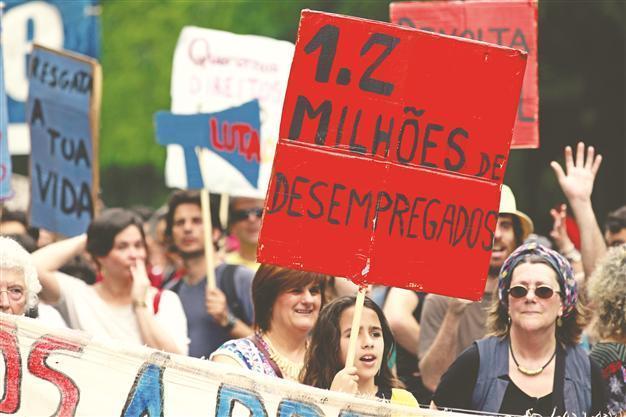Portugal to inject more than 6.65 bln euros in three banks
LISBON / MADRID

A young girl holds a sign with the words ‘1.2 million unemployed’ during an anti-austerity protest in Lisbon last month. Public anger against the measures is on the rise. AP photo
Portugal will inject more than 6.65 billion euros ($8.2 billion) into private banks BCP and BPI, and the state-owned CGD to meet criteria established by the European Banking Authority, the finance ministry said yesterday.“In all, the state will inject more than 6.65 billion euros in these banks,” though five billion euros is to come from an envelope worth 12 billion included in a financial rescue plan drawn up in May 2011, the ministry said.
Portugal last year became the third eurozone country after Greece and Ireland to be bailed out, receiving an EU-IMF package worth up to 78 billion euros in return for a commitment to reform its economy and impose austerity measures.
European Union and International Monetary Fund auditors said in April Portugal was meeting debt-rescue targets and could be strong enough to borrow on financial markets next year but is in a deeper recession than thought.
Spanish woes
In neighboring Spain, Economy Minister Luis de Guindos warned last week that 30 percent of the country’s banks faced similar problems, after Bankia called for the biggest banking rescue in that nation’s history.
Bankia, born out of the merger of seven spanish savings banks in 2010, is asking the state for 19 billion euros to repair its books, in addition to 4.5 billion euros already injected.
Spanish banks are at the heart of fresh market fears that the eurozone’s fourth-largest economy might have to seek an international financial bailout.
Spanish Deputy Prime Minister Soraya Saenz de Santamaria said Thursday that the United States and Spain have discussed the possibility that direct loans from Europe’s emergency fund could be a solution for ailing European banks.
Meanwhile, the number of people claiming unemployment benefits in Spain dropped only slightly in May, a month traditionally good for hiring as companies prepare for the vacation season.
The Labor Ministry reported yesterday a drop of 30,113. That makes for a total of 4.71 million receiving joblessness benefits. It was the second straight monthly decline.
But as in April, the drop was small compared to the same month a year ago --80,000 in May 2011- -in a sign of the recession gripping Spain, the second in three years.
The overall unemployment rate is released separately and quarterly. As of the end of March it stood at 24.4 per cent, and more than 50 percent for people under 25.
The yield on Spain’s 10-year bonds was unchanged at 6.47 percent.
















